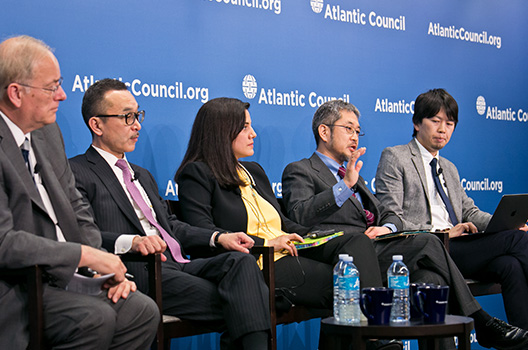 On March 10, 2016 the Atlantic Council’s Rafik Hariri Center for the Middle East and Global Energy Center hosted a panel of distinguished Japan- and Washington-based experts for a discussion on “Japan’s Energy Priorities and Policies in the MENA Region.”
On March 10, 2016 the Atlantic Council’s Rafik Hariri Center for the Middle East and Global Energy Center hosted a panel of distinguished Japan- and Washington-based experts for a discussion on “Japan’s Energy Priorities and Policies in the MENA Region.”
Founding Director and Chairman of the Atlantic Council’s Global Energy Center Ambassador Richard L. Morningstar welcomed the panel, and the Embassy of Japan’s Minister of Political Affairs Mr. Masataka Okano provided opening remarks. Hariri Center Senior Fellow Ambassador Frederic C. Hof moderated the panel with: Dr. Ken Koyama, Managing Director and Chief Economist, The Institute of Energy Economics, Japan; Dr. Sara Vakhshouri, Nonresident Senior Fellow, Global Energy Center, Atlantic Council; Dr. Yasuyuki Matsunaga, Professor of Political Science, Graduate Program in Peace and Conflict Studies, Tokyo University of Foreign Studies; and Dr. Kota Suechika, Visiting Scholar, School of Asian and African Studies, London Middle East Institute.
Koyama opened the discussion with three issues: Japan’s energy policy priorities, Japan’s energy relationship with the MENA region, and the impact of low oil prices on Japan and the stability of the world energy market. Koyama explained that the tsunami that stuck Japan in March 2011 and the ensuing Fukushima nuclear power plant disaster led the Japanese government and people to change directions in terms of energy. Five years later, the government has set a challenging goal of establishing a diverse energy policy by 2030, which includes safe use of nuclear energy as one source. Japan is heavily reliant on the Middle East for energy with 80 percent of crude oil coming from the region and 35 percent of LNG from Qatar. The stability of the region is therefore of great concern to Japan now and in the future. Koyama also explained the coexistence of instability in the region with the low oil price environment, the latter benefiting Japan as an oil importer but also acting as a potential destabilizer itself.
Vakhshouri focused on the energy issues pertaining to Saudi Arabia and Iran, the rivalry between each, and its consequences on the global energy market and stability in the MENA region. Vakhshouri explained that Saudi Arabia is looking to privatize aspects of energy production particularly electricity, which has the potential to create job opportunities to counter those lost due to low oil prices. Further, in the next decade, the demand for electricity in Saudi Arabia will require an investment of 90 billion USD, and the country is introducing different technologies, policies, and incentives to increase efficiency and reduce unethical consumption to meet this demand. The overall policy shift for Saudi Arabia is to create long-term partnerships with different countries for more diverse political alliances and a diverse economy less dependent on crude oil exports. Vakhshouri also explained that significant international interest surrounds the opening of the Iranian energy market, and in turn Iran is trying to match prices, discounts, and contract lengths to those of Saudi Arabia. Iran is also creating more incentives for investors, which benefits the economy but also strengthens the government’s position.
Matsunaga discussed the upsurge in foreign delegations to and the fierce competition among European and Asian countries to expand political and diplomatic relations with Iran. Pertaining to Japan, Matsunaga explained that Japanese Prime Minster Abe’s scheduled visit to Iran by the end of 2016, the first visit since 1978, demonstrates Japan’s commitment to support private sector investment in the country. This commitment is reinforced by the Japanese government’s agreement with Iran promising investment guarantees for longer contract terms. According to Matsunaga, Japanese corporations have a comparative advantage in investment projects because it has maintained a number of projects in Iran since the 1970’s. Rather, the primary potential risk for Japanese investment will be the relationship of the incoming US administration with Iran, as US-Iran relations have greatly impacted Japanese activities in the country. Despite severance of Saudi-Iran diplomatic ties in recent months, Japan has maintained strong Japan-Saudi and Japan-Iran bilateral relations and seeks to broaden these relationships beyond the energy sector.
Suechika discussed Japanese policies pertaining to non-oil producing countries, particularly Syria. This interest historically focused on Palestine and Israel, but in recent years Syria—and Iraq to some extent—have been paramount. Syria’s strategic location greatly impacts the stability and security of the region, and Japan has a particular interest in the containment of the conflict. Nonetheless, Suechika acknowledged that Japan has limited options for action, often maintaining a passive and reactive stance in the region. Its domestic and international constraints result in a policy of non-engagement in the Middle East, and other global conflicts, particularly avoiding intervention. In this way, Japan has been a great financial donor to the region, but does not have a long-term policy strategy for the MENA region. Suechika, however, explained that this ambiguity presents a unique advantage: the government can remain impartial in issues including those that involve the United States, Saudi Arabia, Iran, and Israel. While domestic changes and environmental conditions are shifting, and the rise of the Islamic States of Iraq and al-Sham (ISIS) has become a significant security threat to Japan as well as the region, Suechika indicated that Japan may take increased but still limited action in the region.
